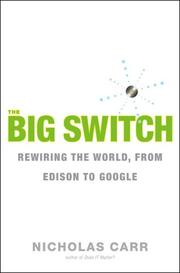| Listing 1 - 3 of 3 |
Sort by
|

ISBN: 041518942X 0415189411 Year: 2000 Volume: *1 Publisher: London, New York : Routledge,
Abstract | Keywords | Export | Availability | Bookmark
 Loading...
Loading...Choose an application
- Reference Manager
- EndNote
- RefWorks (Direct export to RefWorks)
Computer architecture. Operating systems --- Mass communications --- Communicatie en cultuur --- Communicatie en technologie --- Communication and culture --- Communication and technology --- Communication et culture --- Communication et technologie --- Culture et communication --- Communication and culture. --- Communication and technology. --- World Wide Web --- Written communication --- Web --- Communication écrite --- Social aspects. --- Aspect social --- 82:3 --- #SBIB:309H103 --- #SBIB:309H518 --- Literatuur en maatschappijwetenschappen --- Mediatechnologie / ICT / digitale media: sociale en culturele aspecten --- Verbale communicatie: sociologie, antropologie, sociolinguistiek --- Pedagogiek en onderwijskunde --- --Pedagogiek en onderwijskunde --- --Social aspects. --- Pedagogiek en onderwijskunde --. --- 82:3 Literatuur en maatschappijwetenschappen --- Communication écrite --- Written discourse --- Written language --- Communication --- Discourse analysis --- Language and languages --- Visual communication --- Technology and communication --- Technology --- Culture and communication --- Culture --- Social aspects
Book
ISBN: 9780415608596 9780415608602 9780203073599 9781135104320 9781135104276 9781135104313 Year: 2013 Publisher: Milton Park : Routledge,
Abstract | Keywords | Export | Availability | Bookmark
 Loading...
Loading...Choose an application
- Reference Manager
- EndNote
- RefWorks (Direct export to RefWorks)
Translation is living through a period of revolutionary upheaval. The effects of digital technology and the internet on translation are continuous, widespread and profound. From automatic online translation services to the rise of crowdsourced translation and the proliferation of translation Apps for smartphones, the translation revolution is everywhere. The implications for human languages, cultures and society of this revolution are radical and far-reaching. In the Information Age that is the Translation Age, new ways of talking and thinking about translation which take full account of the dramatic changes in the digital sphere are urgently required. Michael Cronin examines the role of translation with regard to the debates around emerging digital technologies and analyses their social, cultural and political consequences, guiding readers through the beginnings of translation's engagement with technology, and through to the key issues that exist today. With links to many areas of study, Translation in the Digital Age is a vital read for students of modern languages, translation studies, cultural studies and applied linguistics.
Translation science --- Computer. Automation --- Translating and interpreting --- Machine translating. --- Internet. --- Littérature occidentale --- Traduction automatique --- Internet --- Traduction --- Innovations --- #KVHA:Vertaalwetenschap --- #KVHA:Digitale vertaling --- Vertalen en technologie --- Vertalen en het internet --- Automatisch vertalen --- Vertalen en technologie. --- Vertalen en het internet. --- Automatisch vertalen. --- Machine translating --- Interpretation and translation --- Interpreting and translating --- Language and languages --- Literature --- Translation and interpretation --- Translators --- Automatic translating --- Computer translating --- Electronic translating --- Mechanical translating --- Algorithms --- Applied linguistics --- Artificial intelligence --- Natural language generation (Computer science) --- Information theory --- Cross-language information retrieval --- Translating machines --- DARPA Internet --- Internet (Computer network) --- Wide area networks (Computer networks) --- World Wide Web --- Translating --- Computer. Informatica. Automatisering --- Vertaalkunde --- Innovations. --- Traduction automatique. --- Littérature occidentale

ISBN: 9780393062281 9780393333947 0393062287 Year: 2009 Publisher: New York : Norton,
Abstract | Keywords | Export | Availability | Bookmark
 Loading...
Loading...Choose an application
- Reference Manager
- EndNote
- RefWorks (Direct export to RefWorks)
A hundred years ago, companies stopped producing their own power with steam engines and plugged into the newly built electric grid. The cheap power pumped out by electric utilities not only changed how businesses operated but also brought the modern world into existence. Today a similar revolution is under way. Companies are dismantling their private computer systems and tapping into rich services delivered over the Internet. This time it's computing that's turning into a utility. The shift is already remaking the computer industry, bringing new competitors like Google to the fore and threatening traditional stalwarts like Microsoft and Dell. But the effects will reach much further. Cheap computing will ultimately change society as profoundly as cheap electricity did. Here, business journalist Carr weaves together history, economics, and technology to explain why computing is changing--and what it means for all of us.--From publisher description.
Computers and civilization. --- Information technology --- Technological innovations. --- Internet. --- Social aspects. --- Computers and civilization --- Technological innovations --- Internet --- Social aspects --- Telecommunication technology --- Computer architecture. Operating systems --- #SBIB:309H103 --- #SBIB:309H1713 --- Automatisation Automatisering --- Banques de données Gegevensbanken --- Bases de données Database --- Internet Internet --- Ordinateurs Computers --- Progrès Vooruitgang --- Breakthroughs, Technological --- Innovations, Industrial --- Innovations, Technological --- Technical innovations --- Technological breakthroughs --- Technological change --- Creative ability in technology --- Inventions --- Domestication of technology --- Innovation relay centers --- Research, Industrial --- Technology transfer --- DARPA Internet --- Internet (Computer network) --- Wide area networks (Computer networks) --- World Wide Web --- Civilization and computers --- Civilization --- Mediatechnologie / ICT / digitale media: sociale en culturele aspecten --- Mediatechnologie: nieuwe toepassingen (abonnee-televisie, electronic mail, desk top publishing, virtuele realiteit...) --- Information technology - Social aspects
| Listing 1 - 3 of 3 |
Sort by
|

 Search
Search Feedback
Feedback About UniCat
About UniCat  Help
Help News
News